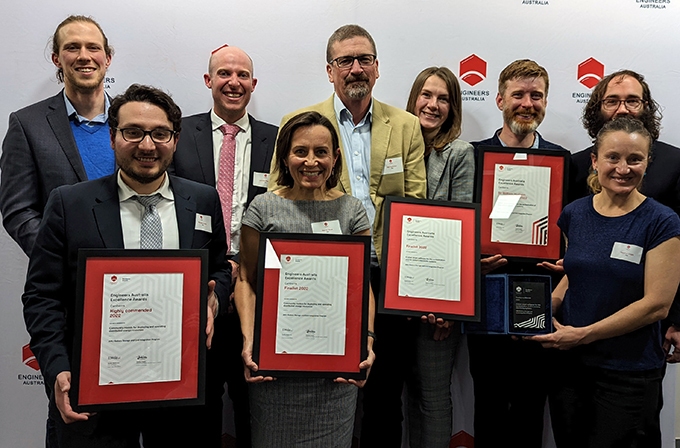Congratulations to the Battery Storage and Grid Integration Program (BSGIP) at The Australian National University (ANU), who along with partner Zepben have recently won this year’s Engineers Australia Canberra Excellence Project Award.
The award recognises the work of the Evolve: smart software for the orchestration of 21st century electricity systems project team which has developed a cost-efficient way to allow more Consumer Energy Resources (CER) to safely enter the electricity grid while ensuring security of supply in the energy sector.
With more than three million households with rooftop solar, it’s estimated that by 2050 we could see between 30 to 45 per cent of annual electricity consumption generated by behind-the-meter energy assets. A major challenge has been how to integrate an influx of CER, such as rooftop solar and batteries, into the network without compromising the physical and technical limits of the network.
The Evolve project team has developed smart software, using dynamic operating envelopes that allows for up to 2.5 times the energy to flow safely through the system without breaching capacity.
“Dynamic Operating Envelopes are a new tool that can allow Consumer Energy Resources to export more energy into the grid, without causing the technical issues that are currently seen in some parts of the country,” said Andrew Fraser, Leader of Engagement, Standards and Regulation at BSGIP.
The software works by observing the patterns of consumption and generation across the network and identifying where hotspots occur. Information is then signalled in advance to the in home energy controller that automatically adjusts the energy response of batteries or solar systems in order to avoid peak congestion periods. It also allows energy service providers to increase the range of services they offer while ensuring limits of the network are not breached.
“Previously, customers were limited to a fixed amount they could export into the grid, based on a worst case scenario that might only happen a few times of the year,” Fraser said. “By continually calculating what is actually happening, customers can effectively put on as much solar as the roof size allows, and export this full amount for most of the year when there is more capacity available.”
Critically the project will pave the way for the development of a set of Australia-wide guidelines for the management of consumer energy resources in the electricity system that are now in the process of standardisation through Standards Australia.
The Engineers Australia Excellence Project Awards recognise Australia’s top engineering projects and the teams behind them. The Evolve project is now in the running for the National Engineers Australia Excellence Awards taking place in Sydney on 5 October 2022.

